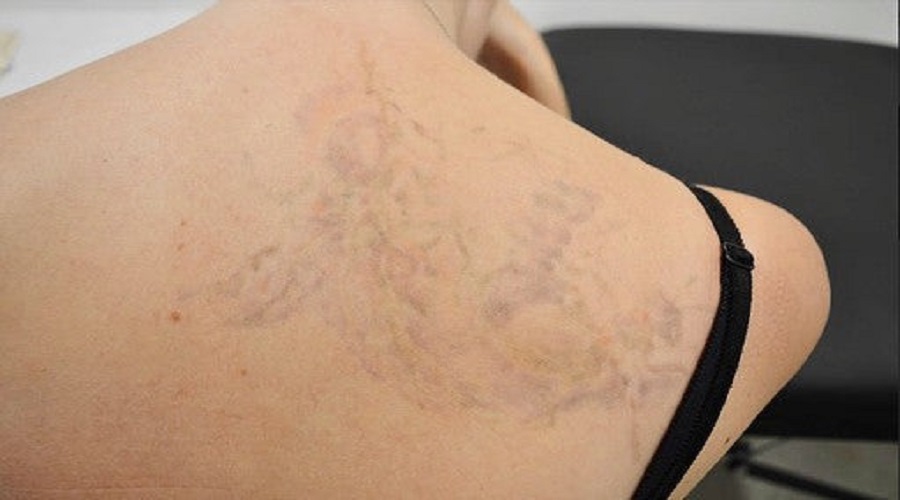Laser tattoo removal can leave a scar, but it depends on the depth of the tattoo and how many treatments are required. If the tattoo is shallow, there is a less chance of scarring. The more treatments that are required, the greater the chance of scarring.
There are a lot of misconceptions out there about laser tattoo removal. One of the most common is that it will leave a scar. But the truth is, laser tattoo removal is a very safe and effective way to remove unwanted ink, and it doesn’t have to leave any permanent marks.
If you’re thinking about getting rid of an old tattoo, or you’re just not happy with your current ink, don’t let the fear of scars hold you back. With today’s technology, laser tattoo removal is more precise and gentle than ever before. And in most cases, it can be done without leaving any noticeable scars.
Does Laser Tattoo Removal cause scars?
Does Laser Tattoo Removal Hurt
When it comes to laser tattoo removal, there is a lot of misinformation out there. A common concern among people considering this treatment is whether or not it will be painful. We’re here to set the record straight: yes, laser tattoo removal can hurt—but it doesn’t have to be unbearable.
The level of discomfort you experience during your treatment will depend on a few factors, including the size and location of your tattoo, your pain tolerance, and the type of laser used. Generally speaking, smaller tattoos tend to cause less discomfort than larger ones, and tattoos on areas with thinner skin (like the wrist or ankle) are more likely to be sensitive than those on thicker-skinned areas (like the back or thigh).
As for pain tolerance, that’s entirely up to you!
Some people report feeling only minor discomfort during their treatments while others find it quite painful. It really varies from person to person.
Finally, different types of lasers can cause different levels of discomfort.
At our office, we use two different types of lasers for tattoo removal: the Q-Switched Nd:YAG laser and the Q-Switched Alexandrite laser. Of the two, most patients find the Nd:YAG laser to be less painful. However, both types of lasers are effective at removing tattoos—so ultimately it comes down to personal preference as to which one you choose.
If you’re concerned about pain during your treatment, we recommend talking to your doctor beforehand so they can help you select the best option for you based on all of these factors. And if you do experience any discomfort during your treatment, know that our team is always here to help make you as comfortable as possible!
Do Tattoo Removal Scars Go Away
Tattoo removal scars are a common concern for those considering tattoo removal. While the majority of people will not experience any scarring from tattoo removal, it is still possible. The good news is that tattoo removal scars can be treated and often go away completely with time.
There are a few different types of scars that can occur after tattoo removal. The most common type of scar is called an atrophic scar. This type of scar appears as a white, depressed area of skin where the tattoo was removed.
Atrophic scars are usually small and do not extend beyond the border of the original tattoo. They are also more likely to occur on areas of the body where the skin is thinner, such as the wrist or ankle.
Another type of scar that can occur after tattoo removal is called a hypertrophic scar.
This type of scar is raised and red, and can extend beyond the border of the original tattoo. Hypertrophic scars are more common in people with darker skin tones, and tend to be larger than atrophic scars.
If you develop a tattoo removal scar, there are several treatment options available to help improve its appearance.
One option is laser resurfacing, which uses pulsed light to stimulate collagen production and improve the appearance of scars. Other options include dermabrasion, which uses abrasive materials to remove surface layers of skin; injections of steroids or other fillers; and surgery to excise thescar tissue .
Talk to your doctor about which treatment option is best for you based on your individual circumstances.
With proper treatment, most tattoos removal scars will eventually fade away .
Does Laser Tattoo Removal Cause Cancer
Laser tattoo removal is a popular treatment for people who want to get rid of their tattoos. The procedure uses laser energy to break up the ink in the tattoo, which is then absorbed by the body.
There is no evidence that laser tattoo removal causes cancer.
In fact, there have been no reports of any health problems associated with the procedure. Laser tattoo removal is considered safe and effective.
How Much Does Laser Tattoo Removal Cost
How Much Does Laser Tattoo Removal Cost?
The cost of laser tattoo removal can vary greatly depending on the size, location, and age of the tattoo. Additionally, the number of sessions required for complete removal will also affect the overall cost.
On average, each session of laser tattoo removal costs between $200 and $500. Therefore, the total cost of laser tattoo removal can range anywhere from a few hundred dollars to several thousand dollars.
Size: The size of the tattoo is one of the biggest factors that will affect the cost of laser tattoo removal.
Larger tattoos will require more sessions to completely remove and will be more expensive as a result. However, it is important to keep in mind that even small tattoos can be difficult to remove and may require multiple sessions before they are completely gone.
Location: The location of the tattoo on your body can also impact its price tag.
Tattoos located on areas with thinner skin (such as ankles or wrists) tend to be easier to remove and therefore less expensive than those located on thicker skinned areas (like the back or chest). Additionally, tattoos located close to sensitive areas like eyes or lips may be more difficult – and thus more costly – to treat.
Age: Older tattoos are generally easier – and cheaper – to remove than newer ones.
This is because older tattoos typically have faded colors which makes them less challenging for lasers to target during treatment. Newer tattoos often contain brighter pigments which can make them more difficult (and costly) to erase.

Credit: elegancybeautybar.com
Does Laser Tattoo Removal Give Scars?
Laser tattoo removal can give scars, but it depends on a few factors. The type of laser used, the color of the tattoo, and the depth of the ink all play a role in whether or not you’ll be left with a scar. If you’re concerned about scarring, talk to your tattoo removal specialist about which laser they recommend for your specific case.
Does the Scar from Tattoo Removal Go Away?
If you’re considering tattoo removal, you might be wondering about the scars it could leave behind. Here’s what you need to know about tattoo removal and scarring.
When it comes to tattoo removal, there are a few things that can affect the amount of scarring that occurs.
This includes the location of the tattoo, the size of the tattoo, and the method used for removal. For example, tattoos located on areas of the body that have a lot of movement (like the elbow or knee) are more likely to result in scarring than those on less mobile areas (like the back or shoulder). Additionally, larger tattoos are more likely to leave behind scars than smaller ones.
And finally, certain removal methods (like laser removal) are associated with less scarring than others (like dermabrasion).
That said, it’s important to keep in mind that even if you do everything right during tattoo removal, there’s still a chance you’ll end up with some scars. But don’t let that deter you from getting rid of your ink if that’s what you really want!
Just be sure to consult with a professional prior to starting any kind of treatment so they can help you manage your expectations.
Does Skin Go Back to Normal After Laser Tattoo Removal?
Laser tattoo removal is a popular choice for people who want to get rid of their tattoos. But what happens to your skin after the treatment? Does it go back to normal?
The answer is yes, but it may take some time. After laser tattoo removal, your skin will be red and inflamed. This is normal and will fade over time.
You may also see some blistering, scabbing, and peeling. Again, this is all part of the healing process and your skin will eventually heal.
Once your skin has healed, you may notice that the tattoo pigment has faded.
This is because the laser breaks up the ink into smaller particles which are then absorbed by the body. The amount of fading will depend on a number of factors including the type of laser used, the color of the ink, and how many treatments you have had. In general, though, most people see significant fading after several treatments.
So if you’re considering laser tattoo removal, rest assured that your skin will eventually go back to normal – although it may take some time and multiple treatments to get there.
How Do You Prevent Scarring After Laser Tattoo Removal?
Laser tattoo removal is a popular treatment to remove unwanted ink. The procedure uses a high-powered laser to break up the ink pigment in the skin. This results in the fading of the tattoo over time.
Most people will experience some degree of scarring after laser tattoo removal. However, there are steps you can take to help prevent or minimize scarring.
Here are four tips for preventing scarring after laser tattoo removal:
1. Choose a reputable clinic or practitioner. Be sure to do your research when choosing a place for your laser tattoo removal treatment. Look for reviews and make sure the clinic is using FDA-approved lasers.
2. Follow all post-treatment instructions. Your practitioner will give you specific instructions on how to care for your skin after treatment. It’s important that you follow these directions carefully to help prevent infection and promote healing.
3. Protect your skin from sun exposure. After treatment, your skin will be more sensitive to sunlight so it’s important to protect it from UV rays by wearing sunscreen and covering up when outdoors.
4 Use moisturizer regularly .
Applying a good quality moisturizer can help keep your skin hydrated and promote healing . Be sure to select one that does not contain any irritants such as fragrance .
Conclusion
Laser tattoo removal is a popular method for removing unwanted tattoos, but some people worry about whether or not it will leave a scar. While it’s true that laser tattoo removal can cause scars, the chances of this happening are relatively low. There are a few things you can do to minimize the risk of scarring, such as choosing a reputable laser tattoo removal specialist and following their aftercare instructions carefully.
If you’re concerned about scarring, be sure to discuss your concerns with your laser tattoo removal specialist before getting started.




